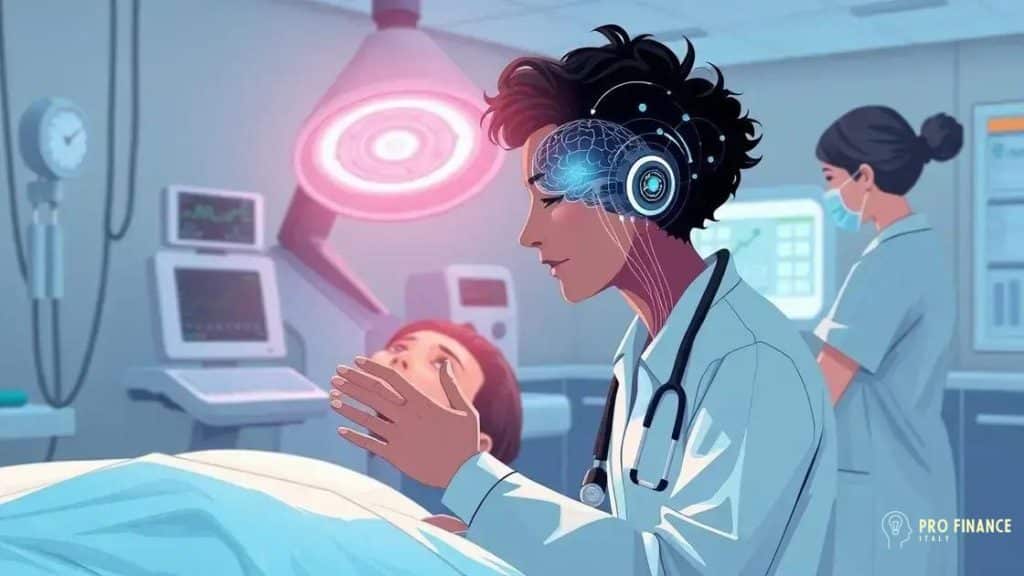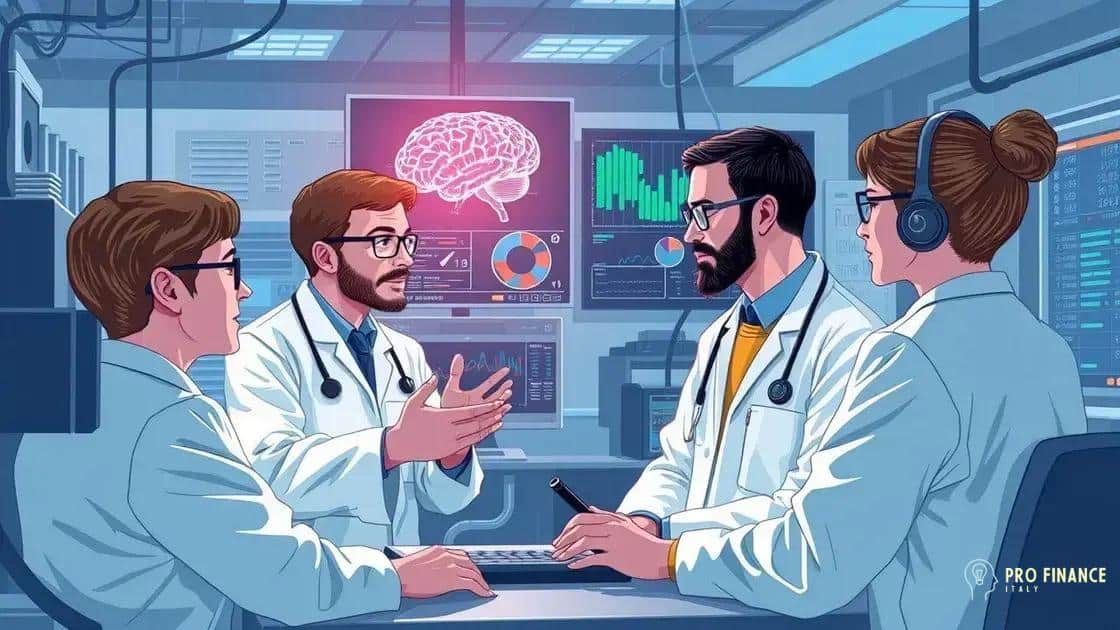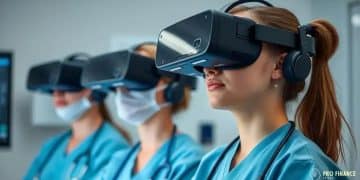The development of brain-computer interfaces for healthcare

The development of brain-computer interfaces for healthcare enables direct communication between the brain and devices, enhancing diagnosis, treatment, and patient autonomy, while addressing challenges in implementation such as ethics and technical limitations.
The development of brain-computer interfaces for healthcare is opening new horizons in medical technology. Imagine a system that can connect the human brain directly to computers, enhancing how we approach patient care. What could this mean for the future of medicine?
Understanding brain-computer interfaces
Understanding brain-computer interfaces is crucial for grasping their impact on healthcare. These innovative systems link the human brain directly to computers, enabling new forms of communication and control.
How Brain-Computer Interfaces Work
Brain-computer interfaces (BCIs) collect brain signals via sensors. These signals are then processed, allowing users to interact with devices. When thoughts are translated into commands, it opens a world of possibilities for those with mobility impairments.
Key Components of BCIs
Several key components make up a BCI system. Understanding these components is essential for appreciating how they function:
- Electrodes: These detect electrical activity in the brain.
- Signal Processing: This interprets brain signals and translates them into data.
- Output Device: This is where the user’s commands are executed, such as a computer or prosthetic limb.
Progress in BCIs has led to astounding advances in medical technology. With further research, they promise to enhance lives by offering solutions that were previously unimaginable. By enabling communication through thought alone, BCIs can in some cases allow individuals to regain control over their environment.
Challenges do remain in the implementation of BCIs. Issues such as safety, user comfort, and long-term functionality need to be addressed. Nevertheless, ongoing research is paving the way for exciting breakthroughs. These interfaces are not just a technological curiosity; they are shaping the future of medicine.
How they enhance diagnosis and treatment

How brain-computer interfaces enhance diagnosis and treatment is a significant topic in modern healthcare. These interfaces offer innovative solutions that improve patient outcomes by providing more accurate diagnoses and targeted treatments.
Enhanced Diagnostics
BCIs allow for real-time data collection from brain activity, enabling healthcare professionals to assess conditions more effectively. By monitoring brain signals, doctors can detect abnormalities that may not show up in traditional tests.
- Rapid Assessment: Quick insights into brain health can lead to timely interventions.
- Personalized Care: Data from BCIs can tailor treatments to individual patients.
- Reduced Errors: Real-time monitoring helps prevent misdiagnoses.
For example, in neurological disorders, BCIs can reveal changes in brain activity that indicate disease progression or response to therapy. This level of monitoring can be crucial for conditions like epilepsy, where timely adjustments to treatment can significantly impact patient quality of life.
Improving Treatment Options
BCIs not only aid in diagnosis but also play a vital role in treatment. By translating thoughts into actions, these systems can assist patients in regaining lost functions.
They are particularly beneficial for individuals recovering from strokes or facing severe disabilities. BCIs facilitate communication and movement, empowering patients to participate more actively in their rehabilitation.
Moreover, BCIs have shown promise in pain management by altering the way the brain perceives pain signals. This innovative approach offers new hope for patients who suffer from chronic pain conditions.
This technology is not only transforming treatment approaches but also encouraging a more patient-centered model of care.
Potential benefits for patients
Potential benefits for patients using brain-computer interfaces (BCIs) are vast and varied. These groundbreaking technologies can enhance patient care and quality of life in numerous ways.
Improved Mobility
Many patients with physical disabilities face challenges in mobility. BCIs can help restore control over their movements, allowing them to navigate their environment more effectively. This is especially important for individuals recovering from strokes or those with spinal cord injuries.
- Regaining Independence: Patients can perform daily activities without assistance.
- Enhanced Rehabilitation: BCIs facilitate targeted therapies that aid recovery.
- Adaptive Technologies: Systems can be customized to suit individual needs.
By giving patients the tools to control devices or prosthetics through thought alone, BCIs promote a sense of independence that can significantly impact emotional well-being.
Better Communication
For those unable to speak or rely on traditional methods of communication, BCIs can offer new avenues for expression. This advancement opens doors for patients with conditions such as ALS or severe speech impairments.
Through thought-driven communication devices, these individuals can share their thoughts and feelings more easily. This capability not only enhances personal connections but also improves the quality of care they receive.
Moreover, BCIs can help patients manage chronic pain by altering how the brain processes pain signals. This novel approach provides a non-invasive alternative to pain management therapies.
With all these benefits, BCIs represent an exciting frontier in healthcare, offering hope and improved outcomes for many patients.
Challenges in implementation

Challenges in implementation of brain-computer interfaces (BCIs) are significant as these technologies become more integrated into healthcare systems. While the potential benefits are vast, there are several obstacles that must be addressed.
Technical Limitations
One major challenge is the technical complexity of BCIs. Developing reliable, safe, and efficient interfaces requires advanced skills in engineering, neuroscience, and computing. As a result, there can be high costs associated with research and development.
- Signal Noise: BCIs often battle interference from external signals, which can disrupt communication.
- Data Processing: Real-time data processing poses a challenge, particularly with the vast amounts of data generated.
- System Integration: Ensuring that BCIs work seamlessly with existing medical devices can be difficult.
Moreover, as BCIs rely on precise measurements of brain activity, any inaccuracies can lead to misinterpreted signals, making it essential to continuously refine these technologies.
Ethical Considerations
The use of BCIs raises important ethical questions. Issues around consent and privacy must be carefully navigated. Patients need to fully understand how their data will be used and how it may affect their treatment.
There is also the potential for abuse in terms of data security and the unauthorized use of brain data. Ensuring that appropriate regulations and standards are in place is vital.
Additionally, equitable access to these technologies must be considered to prevent disparities in healthcare outcomes. Addressing these ethical challenges is as crucial as the technological advancements themselves.
In summary, while BCIs hold promising potential for revolutionizing healthcare, several challenges must be met to ensure their successful implementation.
The future of brain-computer interfaces in healthcare
The future of brain-computer interfaces in healthcare looks promising and is filled with potential. As technology advances, BCIs are set to transform how we diagnose, treat, and manage various medical conditions.
Advancements in Technology
Ongoing research is likely to lead to more sophisticated BCIs that are more efficient and user-friendly. Improvements in materials and nanotechnology could result in smaller, less invasive devices. These advancements will encourage wider adoption among patients and healthcare providers.
- Wireless Connectivity: Future BCIs may utilize wireless technology, making them more convenient and less intrusive for users.
- Longer Battery Life: Innovations may lead to devices that have extended battery life, allowing users to wear them for longer periods.
- Enhanced Data Analysis: Machine learning algorithms can analyze brain data more effectively, improving outcomes.
With these advancements, BCIs will become more integrated into everyday healthcare practices.
Impact on Treatment Modalities
The impact of BCIs on treatment modalities is also significant. They can enhance not just physical rehabilitation but also mental health treatment. By capturing brain activity, therapists can tailor interventions based on real-time feedback.
Imagine using BCIs to help treat conditions like depression or anxiety, where brain activity patterns inform therapeutic strategies. This approach has the potential to revolutionize mental health care, providing tailored solutions.
Furthermore, BCIs may facilitate remote monitoring, enabling healthcare providers to keep track of patients’ progress from a distance. This capability enhances patient engagement and improves outcomes.
Overall, the future holds incredible promise for brain-computer interfaces in healthcare, as they pave the way for more personalized and effective treatments.
FAQ – Frequently Asked Questions about Brain-Computer Interfaces in Healthcare
What are brain-computer interfaces (BCIs)?
BCIs are technologies that create direct communication pathways between the brain and external devices, enabling control and interaction.
How can BCIs improve patient care?
BCIs can enhance diagnosis, treatment, and patient independence, allowing individuals to regain control over their movement and communication.
What challenges do BCIs face in implementation?
Challenges include technical limitations, ethical considerations, costs, and ensuring user privacy and consent.
What is the future of BCIs in healthcare?
The future of BCIs looks promising, with advancements in technology leading to enhanced treatment options and more personalized care for patients.





